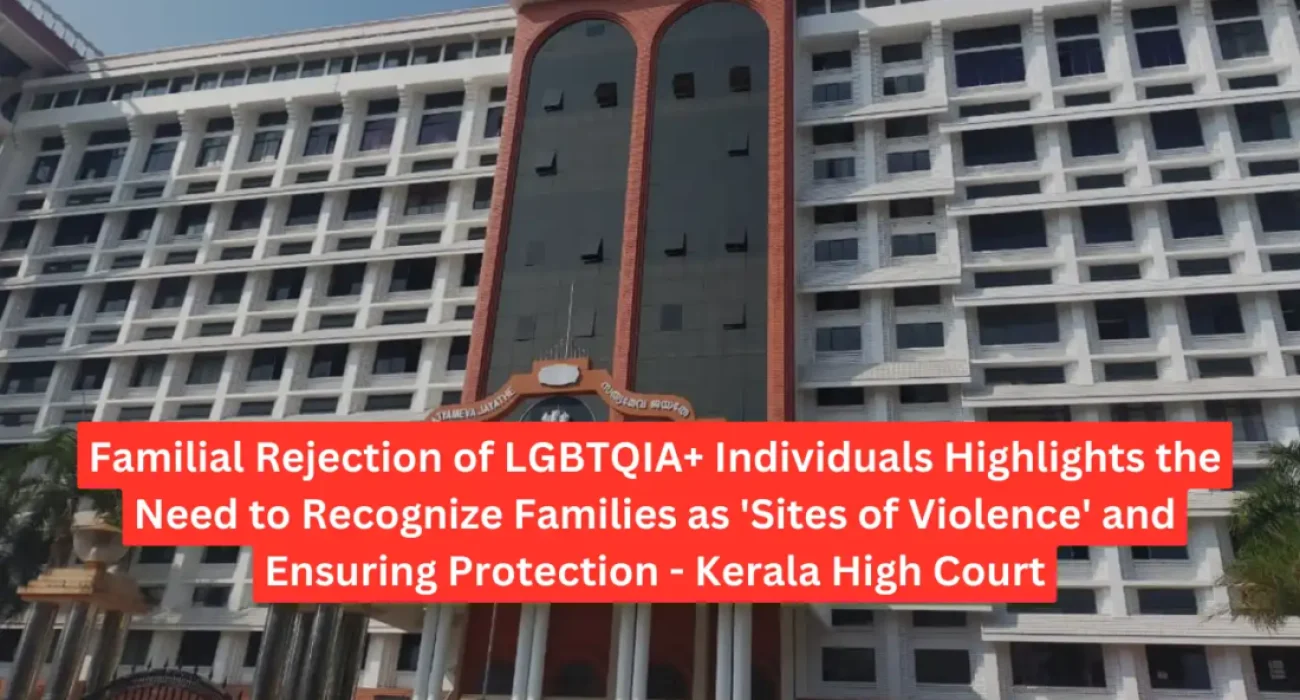

The Kerala High Court recently noted that LGBTIQA+ people need protection rather than guardianship, and that families can frequently turn into places of control and violence. The court recognized that LGBTIQA+ people get to experience violence, discrimination, stigma, and disobedience from society from a young age.
Table of Contents
ToggleThe case involved a 23-year-old woman whose parents filed a plea claiming that their daughter was illegally detained and living in a ‘toxic’ relationship with a person of the same gender. The parents contended that their daughter had been lured into joining an online social media group and required counseling to “overcome” her sexual identity and orientation, which they labeled as psychiatric issues.
The parents contended that their daughter was experiencing behavioral and psychological problems as a result of being excessively affected by some LGBTIQA+ individuals. They stated that following therapy sessions, their daughter was referred to a psychiatrist. They wanted to put an end to their daughter’s relationship through legal means because they thought it was damaging her.
During the court hearing, the petitioner’s daughter claimed that she had willingly and consensually selected her partner. She disclosed that her sexual orientation was mistakenly diagnosed as a mental health problem, and that her parents had forced her to attend therapy in an attempt to change it.
The Division Bench of Kerala HC, consisting of Justice P M Manoj and Justice Raja Vijayaraghavan V, noted that discrimination, stigma, and societal defiance against LGBTIQA+ people in India are caused by false cultural norms and beliefs. The court observed that stigma of this kind can have detrimental long-term effects on mental health, employment prospects, and availability of necessary resources. The court made clear that LGBTIQA+ kids frequently lack essential financial, emotional, and physical support because of parental rejection.
The Court observed that “For many LGBTIQA+ individuals, especially in India, expressing their gender identity or sexuality, is an act of defiance in a society that continues to set rigid cultural norms for gender identity and expression. From an early age, LGBTIQA+ individuals face stigma, violence, and discrimination on the basis of their identity. This stigma is often rooted in inaccurate beliefs and cultural norms that repress gender non-conforming behavior and expressions. The economic, social and political discrimination against them can have long-term impacts on their mental health, employability, access to education, housing and shelter, especially if such individuals experience familial rejection and isolation from social support systems.”
The psychologist’s assessment, which described the woman’s relationship as “toxic,” was chastised by the court for being based on faulty premises. The statement underscored that expressing one’s gender identity or sexual orientation is not a sign of disobedience and cannot be changed via medical intervention. The court referred to the Supreme Court decision in Devu G. Nair v. State of Kerala, which acknowledged that family includes chosen family, particularly for LGBTIQA+ individuals who face violence and indignity from their natal families.
The Court stated that “We are of the view that the report proceeds on a fundamentally flawed premise and is liable to be ignored. The Psychologist appears to have operated under the erroneous presumption that expression of gender identity or sexual preferences by Ms.X is an act of defiance and if treated, her identity and sexual orientation could be altered. Such assumptions are baseless and inappropriate, and the report cannot be used to override the autonomous choices that Ms. X has made.”
The daughter of the petitioner was allowed to continue to live with her preferred partner and on her own terms, according to the Kerala High Court. The concerned SHO was ordered by the court to shield the victim from any threats or acts of violence coming from her relatives. In order to allow her to pursue employment, it ordered the petitioners to turn over her identity documents and certifications.
The court underlined that every person’s life and liberty are protected under Article 21 of the Constitution, irrespective of their identity or sexual orientation. It acknowledged that an LGBTIQA+ person’s right to sexual orientation is an essential component of their identity and privacy. The court expressed hope that the petitioners will eventually show compassion and understanding for their daughter’s sexual orientation and inclinations.
IAW resources
Browse our help directory